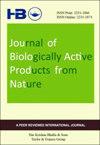对Coumaric Acid在减轻阿霉素诱导的实体瘤和非实体瘤小鼠心脏毒性中的差异作用
IF 1
Q4 CHEMISTRY, MEDICINAL
Journal of Biologically Active Products from Nature
Pub Date : 2021-03-04
DOI:10.1080/22311866.2021.1903997
引用次数: 0
摘要
对香豆酸(pCA)对阿霉素(Dox)介导的正常动物心脏毒性的心脏保护潜力先前已有文献记载。本研究旨在探讨pCA对非肿瘤与道尔顿淋巴瘤腹水(DLA)诱导实体瘤模型中Dox的心脏毒性和抗肿瘤活性的影响。雄性瑞士白化病小鼠分别给予pCA (100 mg/kg b.w.)预处理和共处理,然后给予Dox(累积剂量16 mg/kg b.w.),为期28天。仅Dox处理组血清心脏诊断标志物、脂质过氧化产物和肝脏标志物酶水平显著升高(P<0.05)。观察到pCA预处理组/共处理组抗氧化系统的部分恢复。仅Dox肿瘤组心脏损伤升高;从心脏/体重比、血液学和生化分析的变化可以看出。Dox治疗组显示肿瘤进展显著减少。在肿瘤超组中,pCA治疗似乎没有阻碍/增强dox介导的抗肿瘤活性的功效。这项研究使我们得出结论,pCA可以作为一种有效的分子来对抗Dox诱导的心脏毒性,因为其已被证明的抗氧化特性在给定剂量下不会干扰Dox的抗肿瘤活性。本文章由计算机程序翻译,如有差异,请以英文原文为准。
Differential Effects of p-Coumaric Acid in relieving Doxorubicin induced Cardiotoxicity in Solid Tumour Bearing and Non-tumor Bearing Mice
Abstract The cardioprotective potential of p-coumaric acid (pCA) against Doxorubicin (Dox)-mediated cardiotoxicity in normal animals has been previously documented. The present study sought to examine the effect of pCA on the cardiotoxic and anti-tumor activity of Dox in non-tumor vs. Daltons Lymphoma Ascites (DLA) induced solid tumor model. Male Swiss Albino mice were pretreated and co-treated with pCA (100 mg/kg b.w.), after which Dox (16 mg/kg b.w. cumulative) was administered for a period of 28 days. Levels of serum cardiac diagnostic markers, lipid peroxidation products, and liver marker enzymes were significantly increased (P<0.05) in the Dox only treated groups. Partial restoration of the antioxidant system in the pCA pre/co-treated groups was observed. Cardiac damage was elevated in the Dox only tumor group; evident from changes in the heart/body weight ratio, haematological and biochemical analyses. Dox treated groups showed a significant reduction in tumor progression. pCA treatment did not appear to impede/enhance the efficacy of Dox-mediated anti-tumor activity in the tumor supergroup. This study leads us to conclude that pCA can be explored as a potent molecule to combat Dox-induced cardiotoxicity by the virtue of its proven antioxidant properties with no interference in the anti-tumor activity of Dox at the given dose.
求助全文
通过发布文献求助,成功后即可免费获取论文全文。
去求助
来源期刊

Journal of Biologically Active Products from Nature
Agricultural and Biological Sciences-Agricultural and Biological Sciences (miscellaneous)
CiteScore
2.10
自引率
0.00%
发文量
21
 求助内容:
求助内容: 应助结果提醒方式:
应助结果提醒方式:


